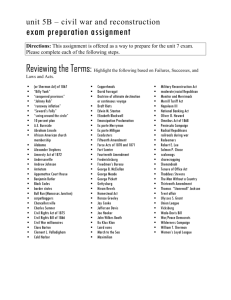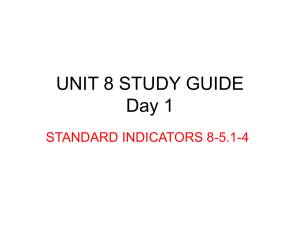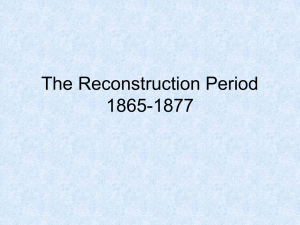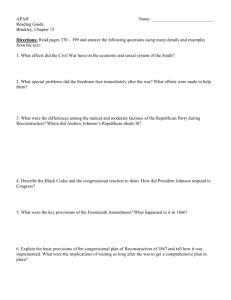Standard 8-4
advertisement
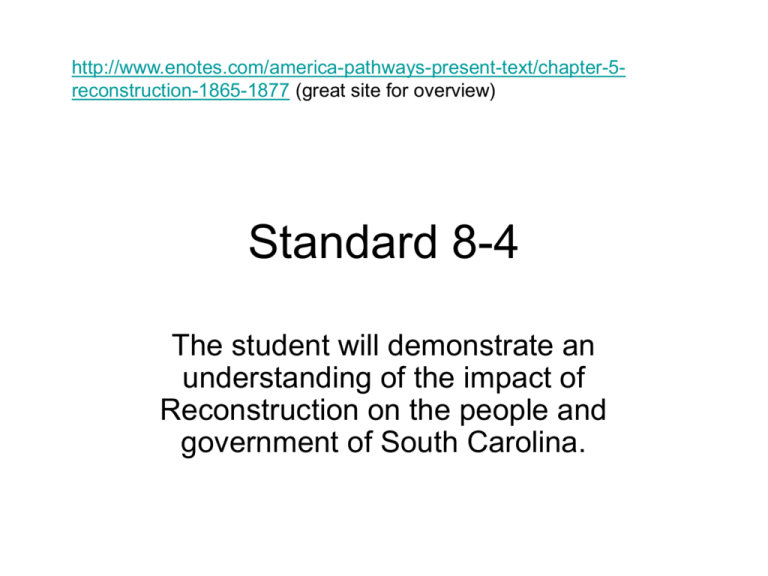
http://www.enotes.com/america-pathways-present-text/chapter-5reconstruction-1865-1877 (great site for overview) Standard 8-4 The student will demonstrate an understanding of the impact of Reconstruction on the people and government of South Carolina. 8-4.1 • Explain the purposes of Reconstruction with attention to the economic, social, political, and geographic problems facing the South, including reconstruction of towns, factories, farms, and transportation systems; the effects of emancipation; racial tension; tension between social classes; and disagreement over voting rights. Reconstruction Policies • Federal Government = National Government • The purpose of their policies were: – Social – Political NOT ECONOMIC They impacted society in SC after the Civil War. President Lincoln’s Plan for Reconstruction • To end the war as quickly as possible. • It was written before the end of the fighting. • Only 10% of SC’s population had to swear allegiance to the UNION. • Then they could be represented in Congress. • Lincoln hoped this would convince SC to surrender. Lincoln’s Purpose • Political – to restore the southern states into full political union with the other states. • Social – Southern states had to recognize the end of slavery. • Economic – State governments would be responsible for reconstructing towns, factories, farms, and transportation systems – NOT the Federal government. They had no money so these needs were not addressed. Lincoln’s Assassination • Did NOT change the Reconstruction plan. • President Johnson continued Lincoln’s 10% policy. • He added that the southern elite (rich white people) had to each request a pardon of the president to embarrass them. • He also made them ratify the 13th amendment that freed the slaves. Congress’s Reconstruction Plan 1. To protect the rights of the newly freed slaves (freedmen). 2. To protect the Republican’s political power. SC hated this plan so………. When congress was not in session SC legislature: 1. Passed “Black Codes” 2. Elected former Confederates to Congress. Black Codes http://afroamhistory.about.com/od/blackcodes/a/blackcodes1865.htm Black Codes • Made it clear that white South Carolinians were NOT going to recognize the social and political rights of the newly freed slaves. http://www.whitehouse.gov/about/presidents/andrewjohnson/ President Johnson • Was against the 14th amendment • Johnson vetoed the Freedman’s Bureau bill These two things greatly changed the course of Reconstruction policy. Congress – “Radical Republicans” In an effort to protect the right of freedmen, they refused to admit returning Southern officials to Congress. Violence in the South against African Americans and President Johnson actions paved the way for the so-called “Radical Republicans” to win control of congress in 1866. “Radical Republicans” 1866 Reconstruction plan • This plan called for military occupation of the former Confederacy. • The south was split into five military districts. • SC was in the second military district. 5 Military Districts • Each district had a military governor. • The army was used to enforce its laws. • Congress impeached Johnson to make sure that as commander in chief he could not undermine its efforts. President Johnson • He was not removed from office after the impeachment. • His power was greatly reduced. • The Union army tried to enforce the Reconstruction policy and the 13th, 14th and 15th amendments. 3 Reconstruction Amendments • The Reconstruction Amendments are the Thirteenth, Fourteenth, and Fifteenth amendments to the United States Constitution, adopted between 1865 and 1870, the five years immediately following the Civil War. This group of Amendments is sometimes referred to as the "Civil War Amendments". • The Amendments were intended to restructure the United States from a country that was (in Abraham Lincoln's words) "half slave and half free" to one in which the constitutionally guaranteed "blessings of liberty" would be extended to the entire populace, including the former slaves and their descendants. • The Thirteenth Amendment (both proposed and ratified in 1865) abolished slavery. The Fourteenth Amendment (proposed in 1866 and ratified in 1868) included the Privileges or Immunities Clause, Due Process and Equal Protection Clauses. The Fifteenth Amendment, (proposed in 1869 and ratified in 1870) grants voting rights regardless of "race, color, or previous condition of servitude". 13th Amendment Section “1. Neither slavery nor involuntary servitude, except as a punishment for crime where of the party shall have been duly convicted, shall exist within the United States, or any place subject to their jurisdiction. Section 2. Congress shall have the power to enfoce this article by appropriate legislation.” • Southern states had to agree to this amendment before they could form new governments. • It freed slaves throughout the United States. • Brought major social change for the southern African Americans. Freedmen • Worked to consolidate their families and communities. • Established a network of churches. • Claimed equal citizenship. • Got educations. • Worked for independence in their lives. The White Population • At first little changed for them. • Social classes remained fairly stable even though they had lost all of their money. • They resented the actions of African Americans. • They also were afraid their former slaves would attack them. Racial tensions escalated (became worse). Social Changes for African Americans • They left the white churches for congregations of their own. • They moved from the slave quarters to plots away from the Big House. • They established their own communities. This separation and white loss of control caused anxiety among whites to escalate. Racial Tension • Terrorist groups such as the Ku Klux Klan formed. • The white population was determined to keep the African American population in “its place” socially, politically, and economically. 14th Amendment • Was designed to protect freedman from intimidation from groups like the KKK. • Overturned the Dred Scott decision (made citizenship of AA’s legal) • All citizens would get “equal protection” and “due process” of laws. • 2/3 of Congress must vote yes to allow exConfederates to hold office. 15th Amendment • Ensured that the “Right to Vote” of ALL male citizens, in the North as well as in the South, would not be denied based on “race, creed or previous condition of servitude.” South Carolina • Refused to ratify the 14th and 15th amendments. As a result of Congressional Reconstruction, the military governor of Military District 2 required SC to hold a convention to write a new state constitution (8-4.3). However, whites boycotted the election of delegates to the constitutional convention. Economic Impact of Reconstruction • Did very little to help the south. • The economy continued to rest on Agriculture and Cotton but with no slaves it depended on sharecropping. • The national government did not rebuild the war-torn region. The South remained in a state of economic depression well into the 20th century (1900 – 1999). Assessments • Students will explain the purposes of Reconstruction policy. • Students will compare the purposes of presidential and congressional plans for Reconstruction. • Students will identify examples of how Reconstruction policy met the social, political, economic and geographic problems that faced SC at the end of the Civil War. • Summarize how emancipation led to racial tension and tension between classes over social equality and voting rights.


